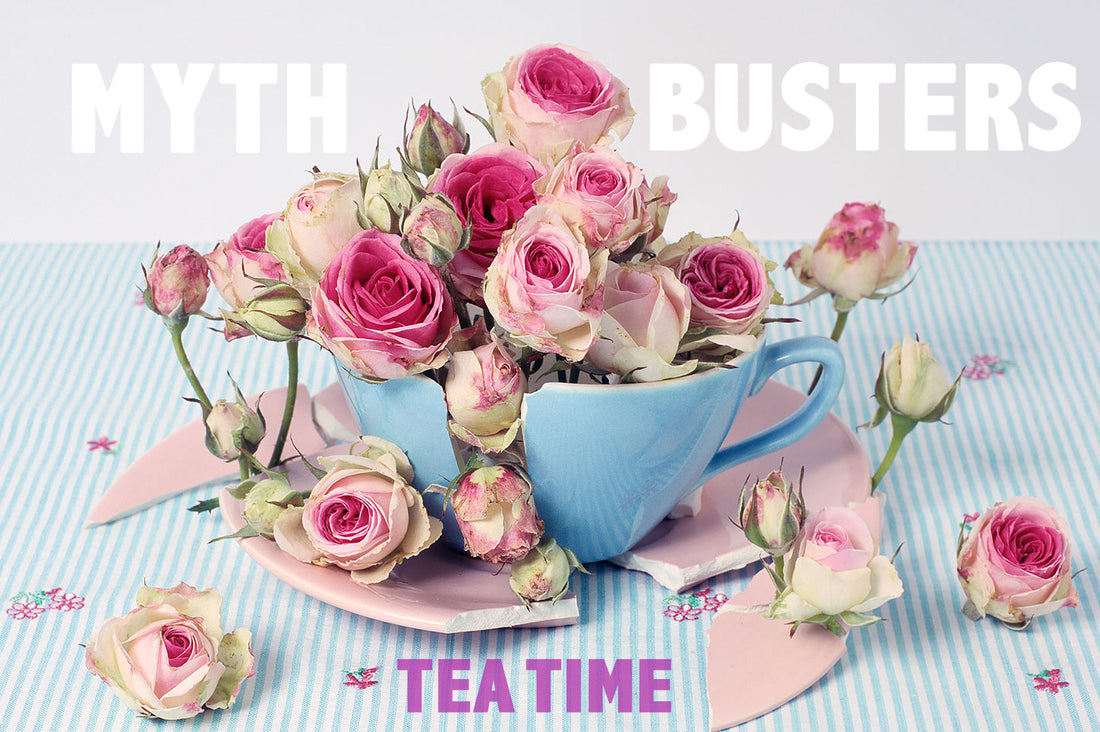
Myth Busters: Tea Time
Share
It’s quite surprising the amount of misinformation there is out there on tea. So, we’re busting down the tea cupboards and disproving some conventionally and long-held beliefs about tea once and for all. Hold on to your teacups, it’s about to be a bumpy brew (pun intended).
MYTH: TEA IS DEHYDRATING
Actually, the opposite is true. Tea is 99.9% water and while teas naturally contain caffeine, which has been linked to have a diuretic effect in high doses (aka many bathroom visits – not fun!), tea has been proven to increase net hydration. A recent study showed that drinking four cups of tea over one day was equally hydrating to drinking an equivalent volume of water. For obsessive tea drinkers like ourselves, this is great news! So, drink up and know that you're not only getting the yummy flavor and other benefits of tea, you're also keeping yourself hydrated all day long!
MYTH: COFFEE IS MORE POPULAR THAN TEA
Most of us are probably guilty of believing this one to be true, what with all the coffee cups we see every morning. But the truth is, tea is the most widely consumed beverage in the world next to water, and can be found in roughly 80% of all U.S. households. On any given day, more than one half of the American population drinks tea. The U.S. market for tea has more than quadrupled over the last twenty years, clearly showing how popular tea really is!
MYTH: TEA IS FOR YOUR GRANDMA, NOT YOU
This is so false - the love for tea is universal! If anything, in the past several years, the younger generation, especially millennials, have been at the forefront of tea’s exploding popularity. An incredible 87% of Millennials drink tea! Interestingly, over a quarter of Americans under-30 year say that they only drink tea, compared to 18% who only drink coffee.
MYTH: TEA IS TEA
Low-quality, non-organic teas are actually far different from premium, organic teas - especially in taste! Often, people lose interest in tea because of one dissatisfying cup, which tends to be made from a low-quality tea bag. Typical tea bags are comprised of small, broken up particles of tea, called tea fannings (or tea "dust"), which brews quickly, but yields a more astringent, bitter, and single-dimensional flavor. High quality teas are comprised of full leaves, which creates the most complex, balanced, flavorful cup of tea. Additionally, high quality, organic teas are less likely to have pesticide residues and chemical toxins than conventional teas, and tend to be ethically sourced from reliable farmers. 
MYTH: WHITE, GREEN, AND BLACK TEAS COME FROM DIFFERENT PLANTS
It may seem that these three different teas come from different plants – hello, they look different, taste different and brew up different colors – but in reality, all true teas (white, black, green, yellow, oolong, and pu-erh) come from the Camellia Sinensis plant. So how can each of these different tea all come from one plant? It's all about the process after they’re picked. White tea is the least processed, green tea is minimally processed and oxidized, and black tea (the most popular in the U.S.) is the most processed and oxidized, hence the dark color and strong flavor!
MYTH: HERBAL TEA IS TEA
Now that you know that all true teas from the same plant, this one may be less of a surprise. Herbal teas are not teas, but are in fact tisanes, or herbal infusions. These ‘tisanes’ don’t come from the Camellia Sinensis plant like ‘true teas’ do, but rather are usually comprised of dried flowers, fruits or herbs steeped in boiling water. What is so wonderful about tisanes is that they deliver a whole slew of different benefits than teas do, because they come from a variety of different plants, each with specific beauty and health-enriching benefits. A cup of Big T NYC’s Flawless rooibos tisane touts collagen-boosting and anti-aging properties, while also being mighty delicious, with its rich earthy flavor and notes of caramel.
So, while some of these myths have been ingrained into our minds for so long, it’s always important to dispel fact from fiction. On a final note, one myth that isn’t false and is actually true is that: tea is delicious and good for you. And yes, we can definitely get behind that one!
(Photo Credit: Liz Wolfe)
